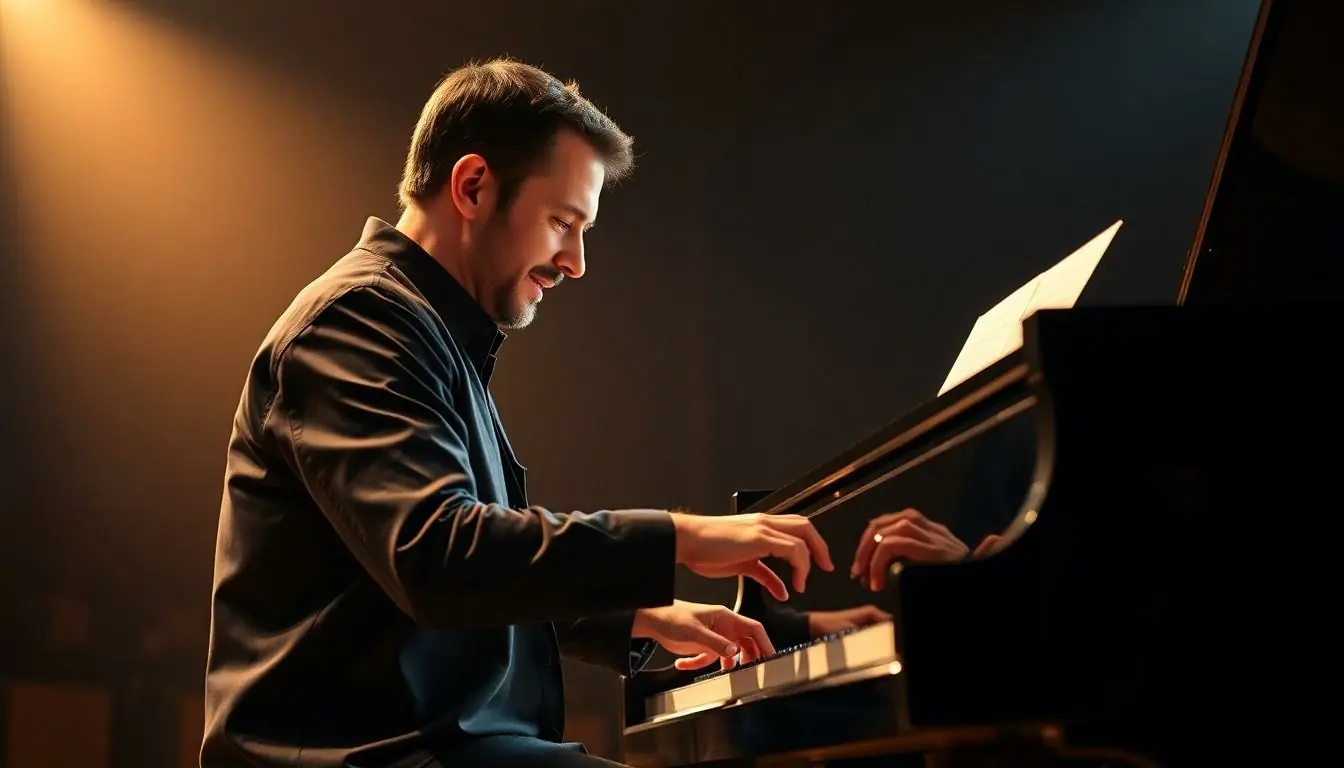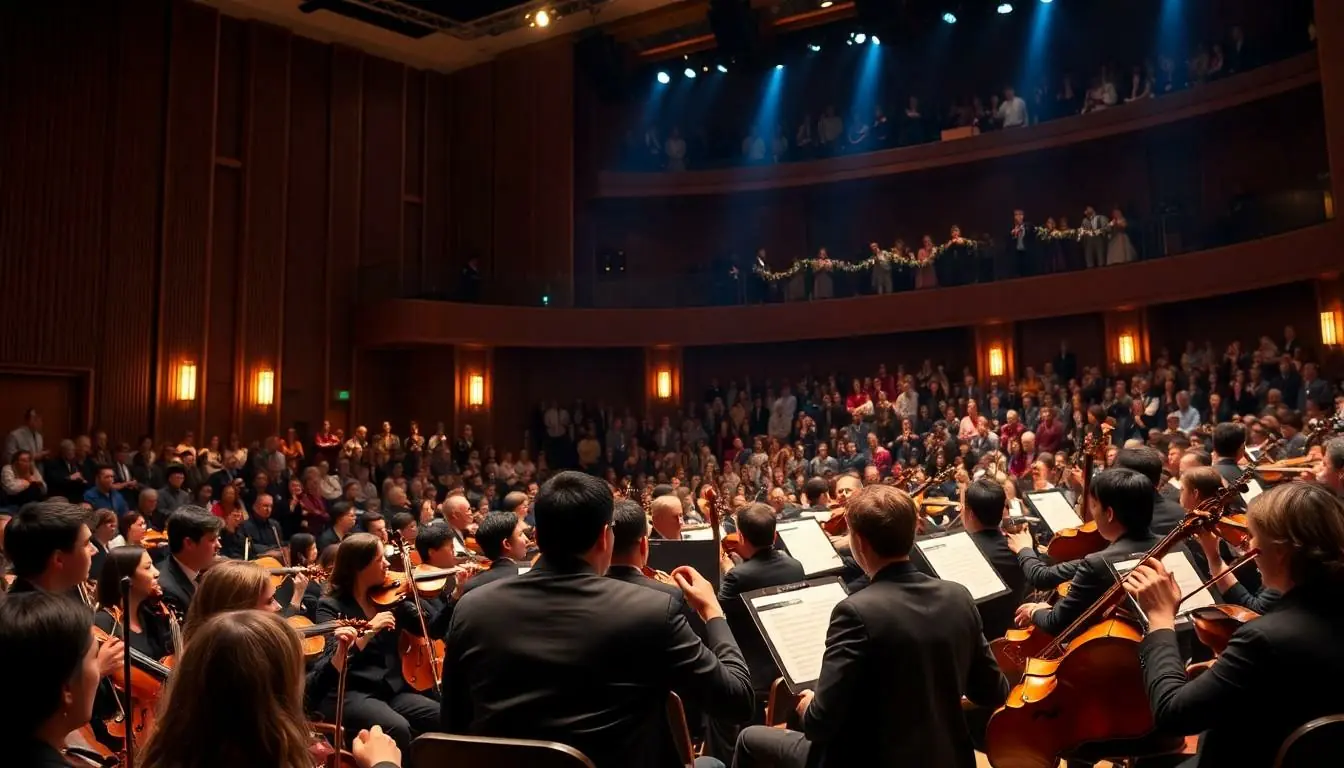Classical music often gets a bad rap, relegated to the background of fancy dinner parties or the soundtrack of a snooze-fest. But let’s face it—there’s a reason Mozart and Beethoven are still rocking the concert halls centuries later. This isn’t just music; it’s a time machine that transports listeners to a world of emotion, drama, and sometimes even a little chaos.
Imagine a symphony that stirs your soul while simultaneously making you feel like a cultured genius. Good classical music can do just that. It’s the perfect blend of elegance and excitement, whether you’re trying to impress a date or just need a soundtrack for your next Netflix binge. Dive in and discover how these timeless masterpieces can elevate your life, one note at a time.
Table of Contents
ToggleWhat Is Good Classical Music?
Good classical music encompasses compositions that resonate on emotional and intellectual levels. Many pieces exhibit clarity and precision in structure, conveying complex feelings to listeners. Composers like Mozart and Beethoven frequently exemplify this artistry with their innovative approaches and distinct styles. Their works demonstrate how melody and harmony can interact beautifully, creating unforgettable sonic experiences.
Various elements contribute to a composition’s quality. The use of instrumentation often plays a significant role, as orchestras combine different sounds to create rich textures. Rhythm also carries weight in classical music, with unique patterns guiding the listener’s emotional responses. Some compositions incorporate dynamic contrasts, enhancing the drama and engagement throughout the piece.
Good classical music invites exploration and reflection. Personal favorites may vary, yet universally appreciated works remain pivotal in developing a deeper understanding of this genre. Specific compositions, such as Beethoven’s Symphony No. 9 or Tchaikovsky’s Swan Lake, serve as benchmarks for emotional depth and musical innovation.
Listening to good classical music fosters a connection between the performer and the audience. Live performances often magnify this bond, with musicians interpreting pieces in ways that breathe new life into familiar scores. By attending concerts or engaging with recordings, listeners can appreciate the nuances and intricacies that define this genre.
Notably, good classical music offers something for everyone, from uplifting symphonies to contemplative chamber pieces. Each composition provides a unique auditory journey, shaping emotional landscapes and inviting listeners into new realms of experience.
Characteristics of Good Classical Music

Good classical music possesses distinct qualities that resonate with listeners. These characteristics elevate compositions beyond mere background sound, creating profound experiences.
Emotional Depth
Emotional depth serves as a hallmark of outstanding classical music. Composers like Beethoven masterfully weave intricate emotions into their pieces, inviting listeners into a rich tapestry of feelings. Each work, whether it’s a poignant adagio or an exhilarating allegro, elicits varying responses. Specific passages within symphonies or concertos can evoke nostalgia, joy, or contemplation, demonstrating the music’s ability to connect deeply with human experiences. Great pieces utilize dynamics and phrasing to enhance this emotional engagement, proving their lasting impact on audiences.
Technical Mastery
Technical mastery is equally crucial for quality classical music. Compositions showcase intricate structures, demonstrating the composer’s craftsmanship. Harmonies and melodies are carefully constructed, creating seamless transitions that captivate listeners. Notable works display a command of musical forms, from sonatas to symphonies, illustrating a deep understanding of theory and instrumentation. Performers, too, exhibit expert level proficiency, bringing to life the nuances intended by the composers. The combination of skilled execution and thoughtful arrangement results in a sound that resonates technically and emotionally, elevating the entire auditory experience.
Popular Composers of Good Classical Music
Classical music boasts a rich tapestry of influential composers known for their extraordinary contributions. Each artist brings unique emotional depth and technical mastery to their works.
Johann Sebastian Bach
Bach stands as a pillar of good classical music. His intricate compositions display unparalleled counterpoint, highlighting his exceptional skill in voice leading. Pieces like the “Brandenburg Concertos” and “Mass in B Minor” showcase a profound understanding of harmony and melody. Bach’s ability to evoke deep emotions through varied dynamics resonates with audiences of all ages. Often regarded as the father of modern harmony, his influence ripples through numerous genres of music today.
Ludwig van Beethoven
Beethoven redefined the boundaries of classical music with innovative structures and emotional intensity. His groundbreaking symphonies, especially Symphony No. 9, revolutionized the orchestral landscape. Themes of struggle and triumph permeate his works, illustrating the power of human emotion. His unique use of rhythm and dynamics elevates compositions, creating compelling auditory experiences. Beethoven’s transition from the Classical to Romantic era marked a pivotal moment, influencing generations of composers.
Wolfgang Amadeus Mozart
Mozart exemplifies the elegance and charm of classical music. Prolific in his output, Mozart penned over 600 works, including beloved operas like “The Marriage of Figaro.” His mastery of melody shines through in symphonies and concertos, captivating listeners with intricate yet accessible compositions. Mozart’s impeccable sense of structure and balance contributes to his timeless appeal. The emotional depth present in his music invites listeners to explore the nuances of human experience.
Recommended Pieces of Good Classical Music
Exploring classical music reveals various compositions that resonate deeply with listeners. The following sections highlight some essential works.
Symphonies
Symphonies represent a grand form of orchestral composition. Beethoven’s Symphony No. 5 exemplifies struggle and triumph through its iconic four-note motif. Tchaikovsky’s Symphony No. 6, known as the “Pathétique,” evokes profound emotional depth and vulnerability. Mahler’s Symphony No. 2, the “Resurrection,” explores themes of life and death with powerful orchestration and choral elements. Each symphony offers a unique auditory journey with its intricate harmonic structures and dynamic contrasts, allowing listeners to experience a spectrum of emotions.
Chamber Music
Chamber music emphasizes intimacy and interaction among musicians. String quartets by composers like Haydn and Schubert showcase intricate dialogues between instruments. Mozart’s Piano Quintet in A Major highlights lyrical melodies and rich textures, inviting listeners to appreciate its elegance. In addition, Brahms’ Piano Quartet in G Minor blends emotional depth with structural complexity, showcasing technical mastery. These works provide a more personal listening experience, making them ideal for both performance and solitude.
Where to Experience Good Classical Music
Classical music can be experienced in various exciting venues and platforms. Recognizing both traditional and contemporary options expands opportunities to connect with this art form.
Concert Halls
Concert halls serve as the perfect venue for live classical music. Famous venues like Carnegie Hall in New York and the Vienna State Opera attract talent and passionate audiences alike. The acoustics in these spaces enhance each performance, allowing listeners to appreciate nuances in dynamics and instrumentation. Attending an orchestral performance brings composers like Beethoven and Tchaikovsky to life through the concert’s energy. Many major cities host seasonal festivals that feature prominent works, elevating the community’s cultural experience.
Online Platforms
Online platforms have revolutionized access to classical music. Websites and apps like Spotify and Apple Music offer curated playlists highlighting iconic works and lesser-known pieces. Streaming services feature exclusive live concert recordings and documentaries, enriching understanding of composers and compositions. YouTube provides access to performances from renowned orchestras worldwide, making it easy to discover new favorites. Engaging with social media pages dedicated to classical music fosters community and encourages shared experiences among fans.
Classical music stands as a timeless art form that transcends generations. Its emotional depth and technical mastery create profound listening experiences that resonate with audiences. The legacy of great composers continues to inspire both new fans and seasoned enthusiasts, inviting exploration and appreciation.
Whether through live performances in iconic venues or the convenience of digital platforms, good classical music is more accessible than ever. It enriches daily life and fosters connections among listeners. As individuals discover their own favorites, they unlock the potential of classical music to enhance their emotional landscapes. Embracing this genre opens doors to a world of creativity and expression that can be enjoyed by everyone.



